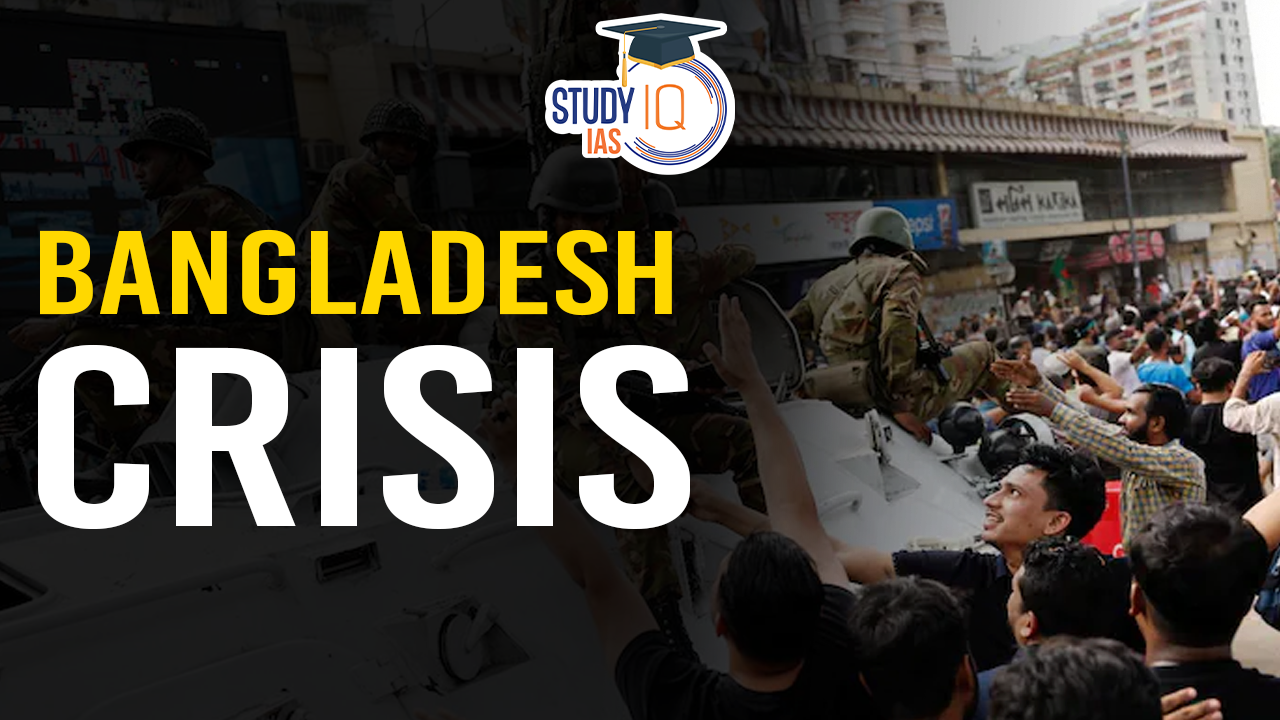The recent political upheaval in Bangladesh underscores the need for India to capitalise on its strong development partnership with Dhaka by working closely with the interim government, the army, and the people.
The ongoing political crisis in Bangladesh has escalated dramatically following the resignation of Prime Minister Sheikh Hasina. Over 232 people have lost their lives in violence and clashes, bringing the total death toll to 560 over the past 23 days. The resignation and subsequent flight of Sheikh Hasina have left the country in a state of turmoil, with the new interim government under Nobel laureate Dr. Muhammad Yunus now facing the daunting task of restoring peace and preparing for upcoming elections. Check Out Details on Bangladesh Crisis 2024: Background, Causes and Key Updates here.
Bangladesh Crisis Latest Updates
- Sheikh Hasina resigned as Prime Minister following intense protests and fled Bangladesh, seeking asylum in India.
- The violence in Bangladesh following Hasina’s resignation has led to the deaths of at least 560 people over the past 23 days, with 232 killed recently.
- Nobel laureate Dr. Muhammad Yunus has been sworn in as the chief adviser of the interim government, promising to restore peace and democracy.
- Key student protest leaders, Nahid Islam and Asif Mahmud, have been appointed to major roles in the interim government.
- Sheikh Hasina’s son, Sajeeb Wazed, has stated that the Awami League will contest the next election, despite the turmoil.
- Sajeeb Wazed accused a foreign intelligence agency, likely the ISI, of instigating the protests that led to his mother’s downfall.
- There has been a significant rise in violence against the Hindu minority in Bangladesh, leading to protests in Dhaka and concerns from international communities.
- India has set up a committee to monitor the situation along the Indo-Bangladesh border and ensure the safety of Indian nationals and minorities in Bangladesh.
Aftermath of Sheikh Hasina’s Resignation
Sheikh Hasina’s sudden resignation has sparked widespread violence across Bangladesh. Her departure has created a power vacuum, leading to clashes between her supporters and opposition groups. According to reports from the Dhaka Tribune, over 232 people were killed in the violence following her resignation, with the death toll continuing to rise.
The political situation remains tense as the Bangladesh Nationalist Party (BNP), the main opposition party, calls for a peaceful transition of power. BNP leaders have emphasized that Indo-Bangla bilateral ties are not solely dependent on the Awami League, Sheikh Hasina’s party, and have urged India to ensure the safety and security of minorities in Bangladesh, particularly Hindus.
Role of Muhammad Yunus Interim Government
Dr. Muhammad Yunus, a Nobel laureate, has been sworn in as the chief adviser to the interim government. Yunus, who returned to Dhaka from Paris, has called for calm and urged the people of Bangladesh to prepare for rebuilding the nation. The interim government faces the challenge of restoring law and order while laying the groundwork for free and fair elections.
Yunus’s leadership will be crucial in navigating the country through this crisis. His interim government includes key student leaders, such as Mohammed Nahid Islam and Asif Mahmud, who played significant roles in the protests leading to Hasina’s resignation. Their involvement signals a potential shift towards a more inclusive and democratic governance structure.
Bangladesh Crisis 2024 Background
Former Prime Minister Sheikh Hasina faced significant political challenges during her tenure, notably the 2009 Bangladesh Rifles (BDR) mutiny shortly after her election, which threatened her newly elected government.
- 2009 BDR Mutiny: This occurred within two months of Hasina’s tenure, resulting in 74 deaths, including 57 army officers. This early crisis marked a significant challenge for her administration.
Recent Events
A crisis unfolded in Bangladesh following the handling of student protests in 2024, leading to calls for change amid widespread discontent over issues like human rights erosion and economic downturns.
- The 2024 election was criticised for low inclusivity, with significant opposition boycotts.
- Student-led Anti-Discrimination Student Movement protests were met with harsh government responses, exacerbating public discontent and sealing Hasina’s political fate.
- General Waker-uz-Zaman stepped in, reflecting a shift in the army’s role from controlling unrest to facilitating democratic processes.
| Myanmar and the Maldives |
| The situation in Bangladesh is compared with ongoing political dynamics in Myanmar, where military control is weakening, and the Maldives, where India supported President Ibrahim Mohamed Solih but faced challenges from opposition factions. |
Bangladesh Prime Minister Resignation
The resignation of Bangladesh Prime Minister Sheikh Hasina has triggered a severe political crisis in the country. Her departure from office has led to widespread civil unrest, with mass protests and violent clashes between demonstrators and law enforcement. This sudden political vacuum has destabilized Bangladesh, leading to concerns about the country’s future direction and stability.
Military Coup in Bangladesh
- Event: Following the resignation of Sheikh Hasina, the Bangladesh Army intervened and staged a coup. The military cited the need to restore order and stability as their justification for seizing control.
- Consequences: The coup has led to the establishment of an interim government, raising concerns about the erosion of democratic processes and the potential for prolonged military rule.
Causes of Bangladesh Crisis
Bangladesh has been a crucial ally for India, fostering strong economic, social, and cultural ties. Under Sheikh Hasina’s leadership since 2009, the bilateral relationship flourished, with significant trade and security cooperation advancements. However, her sudden resignation has led to severe political turmoil and social unrest, threatening these achievements.
| Who was Sheikh Mujibur Rahman? |
| Sheikh Mujibur Rahman, often referred to as the “Father of the Nation” in Bangladesh, was a pivotal figure in the country’s history. He was the leader of the Awami League and played a crucial role in the struggle for Bangladesh’s independence from Pakistan in 1971. Rahman served as the first President of Bangladesh and later as Prime Minister. His leadership and vision were instrumental in shaping the early years of the nation. |
Background of Reservation Policy in Bangladesh
- Original Notification (1972): On September 5, 1972, a system reserving 30% of government and semi-government posts for freedom fighters, and 10% for women, was established.
- Post-Assassination Freeze: Following the assassination of Sheikh Mujibur Rahman in August 1975, these quotas were frozen until 1996.
- Extension to Descendants: When Hasina became Prime Minister in 1996, benefits of the freedom fighters’ quota were extended to their children, and later to their grandchildren in 2011.
- Developments Post-2001: The implementation of the quota system slowed after the Awami League lost power in 2001 but picked up again when Hasina returned to power in 2009.
- 2018 Withdrawal of Quota: In 2018, the Hasina government decided to scrap the freedom-fighter and other quotas, which was challenged in court.
- The High Court ruled the government’s decision was arbitrary, affirming that freedom fighters and their progeny were still considered backward.
- Supreme Court Decision: A temporary scaling down of the reservation on July 21 only momentarily calmed the protests, which soon resumed with increased intensity.
- Security Response: The government’s harsh crackdown resulted in over 100 deaths in just two days and around 300 in two months.
Political Background
- Election Credibility: Hasina’s Awami League won a third consecutive term in January, but the election’s credibility was marred by opposition boycotts and allegations of electoral fraud.
- Suppression of Opposition: The last decade of Hasina’s rule saw increased arrests of opposition leaders and crackdowns on dissent and free speech, intensifying in the past six months.
- Development Narrative: While Bangladesh remains one of South Asia’s fastest-growing economies, the development under Hasina has not met the aspirations of a demographic where over 60% are aged 15-65.
- Many businesses have not recovered from the COVID-19 crisis.
- Civil Unrest: The most severe civil unrest in two decades erupted over a controversial quota system for government jobs, reserved for descendants of freedom fighters. The unrest escalated from campus protests to nationwide violence.
Cultural and Ideological Divisions
- Secular vs. Muslim Nationalism: Bangladesh is deeply divided between secular nationalists and Muslim nationalists who did not support the 1971 liberation war.
- Hasina often used the Awami League’s role in the liberation as a political tool, exacerbating tensions.
- Authoritarian Rule: Hasina’s authoritarian tactics, including her denunciation of student protesters as “razakars,” have possibly paved the way for the resurgence of Islamist and pro-Pakistan sentiments in Bangladesh.
Check here: Bangladesh Students Protest Against Job Quotas
India-Bangladesh Border on High Alert
In response to the crisis, India has placed its border with Bangladesh on high alert. This includes enhanced security to manage the potential spillover of violence and to prevent illegal crossings. The unrest has affected cross-border relations, including trade and connectivity. India is concerned about potential disruptions in movement and trade, which could impact both economies.
Bangladesh Army Announces Interim Government
- The interim government, declared by the military, is intended to oversee the country until new elections can be organized. This move is designed to stabilize the situation but has faced criticism and scepticism.
- The announcement has drawn mixed reactions from the international community. Some view it as a necessary step to restore order, while others see it as a setback to democratic governance and human rights.
Timeline of Bangladesh Crisis 2024
| Date |
Event |
Details |
| August 2024 |
Prime Minister Resignation |
Sheikh Hasina resigns, leading to widespread protests and political instability. |
| August 2024 |
Military Coup |
Bangladesh Army stages a coup, citing the need to restore order and stability. |
| August 2024 |
Interim Government Announced |
Military announces an interim government to oversee the country until new elections can be organized. |
| August 2024 |
Safety of Hindus Concerns |
Reports of targeted violence against Hindu minorities, raising concerns about their safety. |
| August 2024 |
India-Bangladesh Border on High Alert |
India heightens border security to manage potential violence spillover and prevent illegal crossings. |
| August 2024 |
International Reactions |
Mixed responses from the international community regarding the military coup and interim government. |
| August 2024 |
Economic Impact |
Disruption in trade relations between India and Bangladesh, affecting key exports and economic ties. |
Key Implications of Bangladesh Military Coup
- Economic Impact: The disruption in Bangladesh’s political stability could affect bilateral trade, which reached $13 billion in the 2023-24 financial year. Key exports from India include cotton, petroleum products, and cereals. Any interruptions could have significant economic repercussions for both countries.
- Strategic Concerns: India’s strategic interests are at stake, including counter-terrorism efforts and regional stability. The military coup and the potential for extended instability could undermine joint efforts in these areas.
- Humanitarian and Diplomatic Response: India may need to provide humanitarian aid and support to affected communities, including refugees. Diplomatic efforts will be crucial in managing the crisis and fostering a peaceful resolution, while also protecting India’s interests.
- Regional Stability: The crisis in Bangladesh affects regional dynamics, potentially influencing neighbouring countries and regional security arrangements. The international community’s role in supporting stability and democratic processes will be vital.
Bangladeshi Hindus in Danger?
The political instability in Bangladesh has raised significant concerns for the safety of its Hindu minority community. Amidst the turmoil following Prime Minister Sheikh Hasina’s resignation and the subsequent military coup, there are reports of targeted attacks on Hindu homes, businesses, and places of worship.
Historical patterns suggest that political crises in Bangladesh often lead to increased violence against minorities, heightening fears for their safety. The international community and human rights organizations are calling for protective measures and support to ensure the safety and security of Bangladeshi Hindus during this period of unrest.
India’s Diplomatic and Strategic Response
Diplomatic Efforts
India is closely monitoring the situation. External Affairs Minister S. Jaishankar has briefed an all-party delegation, ensuring a unified approach to the crisis. India is prepared to offer humanitarian assistance, including medical aid and supplies, to support Bangladesh during this challenging time.
Trade Adjustments
Indian exporters and businesses are making contingency plans to mitigate the impact of the crisis. The next few days will be critical in determining the extent of the disruption to trade and economic stability.
Challenges and Opportunities for India
- Military and Governance: The army’s new role includes potential vulnerabilities, such as managing diverse and polarised political forces and addressing the rise of anti-India sentiments among certain groups.
- The appointment of Nobel laureate Muhammad Yunus as the head of the interim government presents a new direction for leadership away from traditional party politics.
Future Outlook and Recommendations
Role of the Interim Government: The leadership under Yunus and the army’s backing might foster a new political environment, aiming for democratic restoration but facing challenges from entrenched political forces and external influences.
- India’s strategy involves supporting democratic transitions and development projects, maintaining a balance between fostering good relations and addressing regional security concerns.
Sharing is caring!


 Transforming a Waste-Ridden Urban India:...
Transforming a Waste-Ridden Urban India:...
 Carbon Border Adjustment Tax (CBAM): Mea...
Carbon Border Adjustment Tax (CBAM): Mea...
 RBI Financial Stability Report 2025: Eco...
RBI Financial Stability Report 2025: Eco...

























